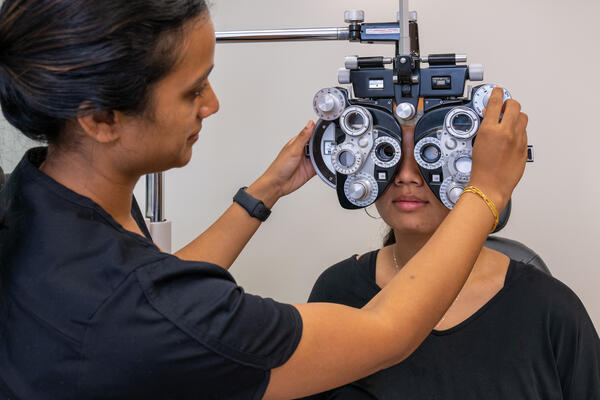Is Refractive Surgery Right for You? Aspects to Consider for Better Eyecare
In the realm of eye treatment, the decision to go through refractive surgical procedure is a substantial one that demands thoughtful factor to consider. As people look for clearness and liberty from the restrictions of rehabilitative lenses, various factors come right into play when identifying the viability of such a procedure. From the intricacies of one's eye wellness to the complexities of daily routines and individual expectations, each facet holds relevance in the more comprehensive landscape of refractive surgical procedure candidateship. By evaluating these vital aspects with care and accuracy, a clearer path towards notified decision-making arises.
Eye Health And Wellness Examination
When thinking about refractive surgical treatment, a thorough eye health analysis is vital to examine the viability of the treatment for every person. neurologist andalusia. This evaluation involves a collection of evaluations and examinations conducted by an eye care specialist to figure out the general health and wellness of the eyes, the existence of any hidden conditions, and the security of the refractive mistake
During the evaluation, various factors are considered, such as the person's medical history, present eye prescription, corneal density, student dimension, and tear film quality. These analyses aid to determine any contraindications to refractive surgical procedure, such as corneal problems, cataracts, or untreated eye infections. Additionally, the examination assists to take care of individual assumptions relating to the possible end results of the surgical procedure based on their one-of-a-kind eye features.
Eventually, the eye wellness analysis is important in ensuring the safety and security and efficiency of refractive surgery, as it offers useful understandings right into the individual's eye health and wellness condition and helps identify the most ideal treatment options for attaining optimal visual outcomes. (eye doctors in andalusia)
Lifestyle Assessment
A thorough way of living analysis is essential in identifying the suitability of refractive surgical procedure for an individual's aesthetic modification needs. Way of living variables such as profession, leisure activities, and everyday tasks play a vital duty in the decision-making procedure regarding refractive surgical procedure.
Additionally, lifestyle practices such as sporting activities engagement, outdoor tasks, or also skin care regimens can influence the healing process and total success of refractive surgery. By carrying out an extensive way of life analysis, eye treatment professionals can tailor their suggestions and treatment plans to fulfill the special requirements of each individual, eventually leading to enhanced visual outcomes and complete satisfaction.
Assumption Placement

Individuals require to understand that while many people achieve 20/20 vision or better complying with refractive surgery, some may still call for glasses for particular tasks like analysis or driving at evening. Handling these expectations helps stop frustration and dissatisfaction post-surgery, leading to a much more favorable general experience for the client.
Threat Evaluation

Aspects that might increase the threat of difficulties consist of age, specific medical problems like autoimmune diseases, unpredictable vision prescription, thin corneas, and impractical individual expectations. Additionally, choosing a skilled and knowledgeable cosmetic surgeon, following pre and post-operative treatment instructions diligently, and revealing any kind of relevant clinical background can assist alleviate dangers.
To decrease the possibility of problems, eye doctors perform detailed pre-operative assessments to determine any kind of contraindications to surgical procedure. They likewise go over the potential threats and advantages with individuals throughout the assessment process. By involving in open interaction and shared decision-making, both the ophthalmologist and the person can interact to figure out if refractive surgery is the right selection based upon specific risk profiles and wanted end results.
Examination Importance
Thinking about the essential duty of notified decision-making in evaluating risks and potential issues in refractive surgical procedure, the appointment procedure holds significant relevance in leading clients towards optimum outcomes. During the assessment, the ophthalmologist examines the person's eye health and wellness, refractive mistakes, and overall viability for surgery. This first assessment is essential in determining one of the most ideal procedure for each and every individual, considering elements such as corneal thickness, pupil size, and existing eye problems.
In addition, the appointment functions as a chance for clients to review their assumptions, problems, and any kind of inquiries they might have relating to the surgical procedure. Clear interaction between the surgeon and the client is vital to make sure sensible assumptions and a thorough understanding of the prospective risks and advantages included.
Additionally, the examination permits the specialist to discuss the different surgical alternatives readily available, their respective results, and the post-operative treatment called for. This detailed conversation empowers patients to make well-informed choices about their eye treatment, leading to better fulfillment and results post-surgery.
Final Thought
In final thought, individuals thinking about refractive surgical procedure needs to undertake a thorough eye health analysis, assess their way of life practices, straighten their expectations with possible outcomes, evaluate the involved the original source threats, and prioritize examinations with eye care professionals. These elements play an essential role in establishing the suitability of refractive surgical treatment for every person, ensuring optimum results and complete satisfaction with the treatment.
Individuals thinking about refractive surgical treatment usually have high assumptions regarding the end results, expecting perfect vision without the demand for glasses or contact lenses. While refractive surgical procedure can significantly improve vision and decrease dependence on visual help, it is essential for people to comprehend that results may differ based on private elements such as the degree of refractive mistake, corneal density, and total eye health and wellness.
By involving in open interaction and shared decision-making, both the eye doctor and the patient can function with each other to establish if refractive surgery is the right choice based on specific threat profiles and wanted outcomes.
Considering the important function of notified decision-making in analyzing dangers and potential problems in refractive surgical treatment, the appointment procedure holds significant importance in leading people in the direction of optimal results. During the examination, the eye doctor examines the person's eye wellness, refractive mistakes, and overall suitability for surgical procedure.